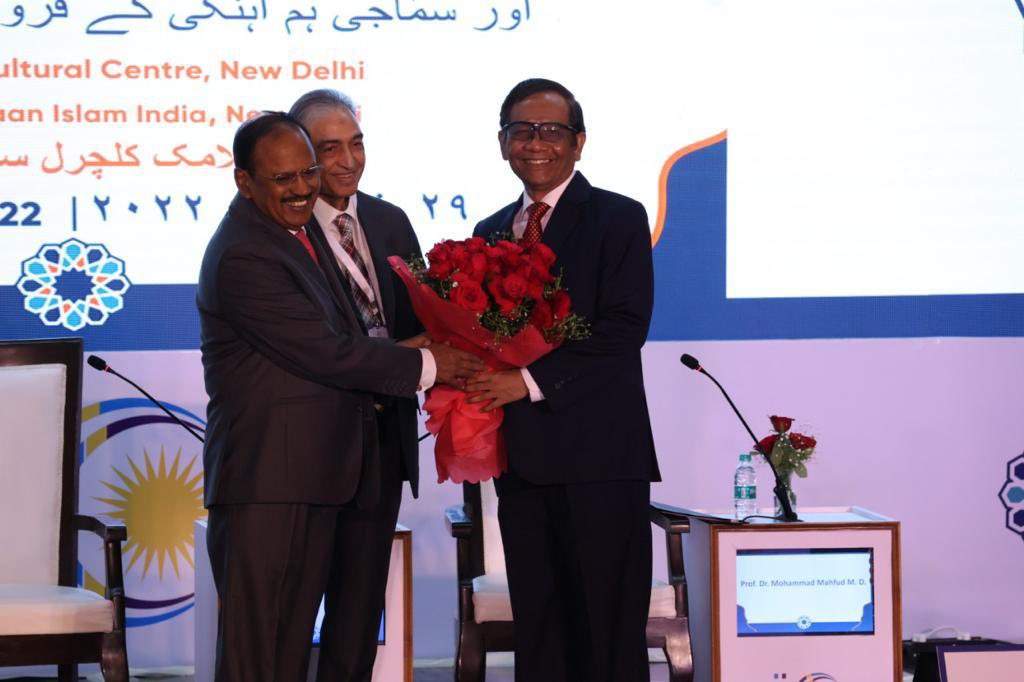

NSA Ajit Doval welcomes his Indonesian counterpart before launch of major joint initiative on counter-terroism
India and Indonesia have launched a major ideological campaign to counter terror leveraging their common tradition of tolerance and diversity.
Addressing a conference on the role of Ulema in India and Indonesia to foster peace, National Security Adviser (NSA) Ajit Doval pointed out that with Indonesia, having the world’s largest Muslim population in the world, and India and the third highest, together the two countries can turn the ideological balance in favour of moderation versus extremism. “Together we have 1.7 billion of the world’s population to preserve and promote the true values espoused by our religions. Together we should strive to propagate moderate virtues of Islam as a beacon hope and cooperation for the entire world”. Doval was speaking in the presence of his Indonesian counterpart Mohammed Mahfud, who had brought a delegation of Ulemas from Indonesia for the conference.
NSA Doval pointed out that in the backdrop of a major churn in the global order, a strategic partnership between India and Indonesia can foster peace, regional cooperation and prosperity in Asia. “It is at such times that countries like India and Indonesia with their experience of multi-faith harmony and co-existence can send a joint message to the world… This will be a powerful symbol of the determination of two large countries.”
The conference follows a trip in March to Indonesia by Doval and the visit earlier this month to Bali by the Prime Minister, Narendra Modi for the G-20 summit. A pivotal state, India fully recognises Indonesia’s strategic importance as a doorway to the Indo-Pacific region.
Doval said that with the support of the Ulemas, it was essential for the two countries to proactively develop a common narrative on deradicalization. “The Ulama have a pivotal role in promoting the original teaching of tolerant principles of Islam and counter radicalisation and extremism with progressive ideas and thought.”
NSA Doval counselled the Ulemas that in order to win the war of narratives, of which the youth are prime targets, the religious scholars must be adept at the use of technology and deploy it to counter evil designs of propaganda and hate. It is important to be “proactive and not react to agenda set by inimical forces’.
He also stressed that state institutions also needed to come together to detect and share information to counter negative influences in society.
“Both our countries have been victims of terrorism and separatism. While we have overcome the challenges to a considerable extent, the phenomenon of cross-border and ISIS-inspired terrorism continues to pose a threat. Cooperation of the civil society is essential in countering the threat from ISIS-inspired individual terror cells and returnees from theatres like Syria and Afghanistan,” Doval said.
The NSA asserted the narrative of terror cannot be justified. “None of the ends for which extremism, radicalisation and the misuse of religion are employed are justifiable on any ground. This is a distortion of religion against which all of us need to raise our voices.”
“Extremism and terrorism are against the very meaning of Islam because Islam means peace and well-being (Salamati/Asalaam). Opposition to such forces should not be painted as a confrontation with any religion. That is a ruse,” he observed.
Referring to the teachings of Holy Quran, Doval further said, “Instead, we should focus on the real message of our religions, which stands for the values of humanism, peace and understanding. Indeed, as the Holy Quran itself teaches, killing one person is like killing all humanity and saving one is akin to saving humanity. Islam ordains that the most excellent form of Jihad is ‘Jihad Afzal’ – that is, Jihad against one’s senses or ego- and not against innocent civilians.”
“We also need to counter disinformation and propaganda that can impede peaceful co-existence among the followers of different faiths. Islam emerged as a rallying point for the disadvantaged and was tolerant in its outlook. After the Prophet’s demise fissures emerged among the Caliphs on the question of his legitimate heir. Each faction attempted to outdo the other by espousing a more radical interpretation of the Hadiths.”
The NSA asserted that India and Indonesia must dig into its own historical traditions for guiding their positive discourse.
“We have vast and extended cultural, economic and spiritual contacts for 1600 years up to the 14th century. These contacts showed us the value of openness, engagement and respect for diversity. In the 7th century India’s Malabar coast became a meeting point for Arab and Indonesian traders from where they transmitted Islam to southeast Asia.”
The NSA said that, “It is crucial that we share and understand the historical and cultural context of this plan…which has peaceful and tolerant underpinning.”
Also Read: Doval flags movement to foster communal harmony with Indian roots
Chinese generative AI platform DeepSeek passed on personal details of Korean users to firms in…
The Jammu and Kashmir Police have released sketches and identities of three terrorists said to…
Asserting that India will not rest until "justice" is pursued, Prime Minister Narendra Modi on…
Prime Minister Narendra Modi observed a moment of silence to pay tribute to those who…
All India Institute of Medical Sciences, Raipur successfully performed its first Swap Kidney Transplant, also…
Following the deadly terror attack in Pahalgam, tensions between India and Pakistan have further escalated…